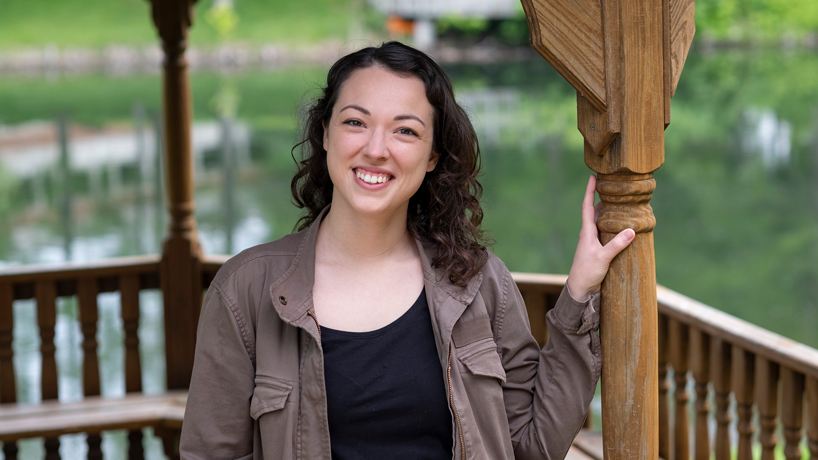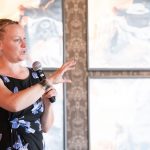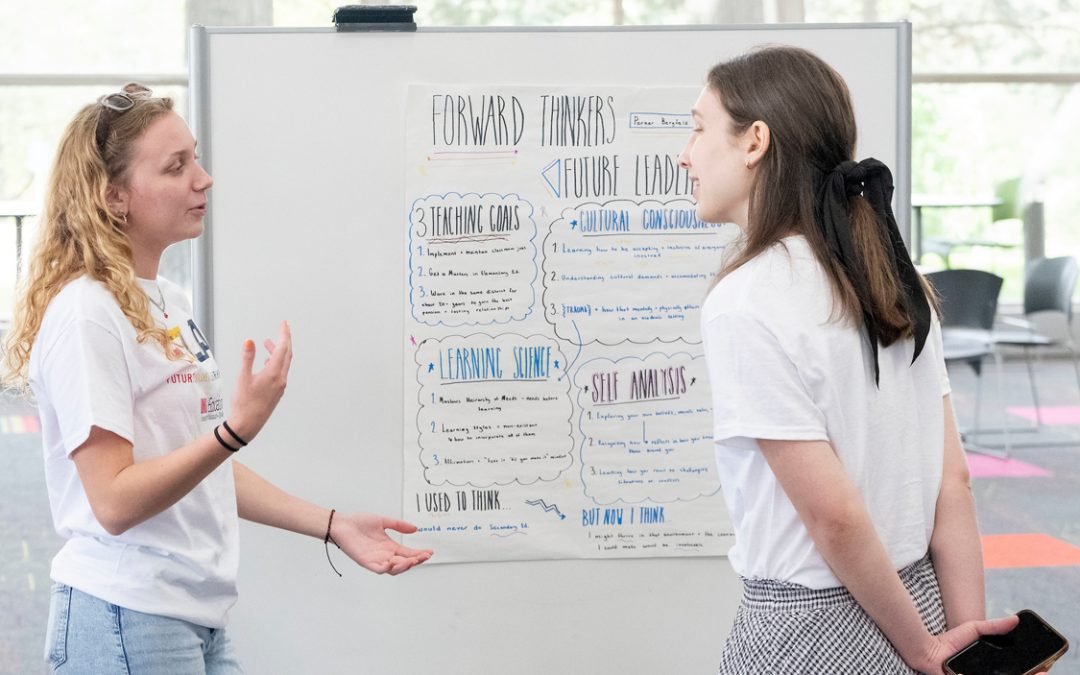
Biology major Gabriela Hernandez is completing work on her bachelor’s degree this summer and has begun working as a lab assistant at the Danforth Plant Science Center. She plans to apply to doctoral programs in biology later this fall. (Photo by August Jennewein)
Gabriela Hernandez spends her days immersed in the rows and rows of plants growing in greenhouses at the Donald Danforth Plant Science Center.
Hernandez, who is completing her bachelor’s degree in biology this summer at the University of Missouri–St. Louis, landed a position as a lab assistant working in the lab of Jim Carrington, the president of the center.
She helps tend to the plants and the lab space, cleaning up, washing dishes and doing other tasks as needed to help keep the research in his lab progressing.
“They’ve got a ton of greenhouses just filled with plants. It’s huge and breathtaking,” said Hernandez, who began her job in May. “I’m really hoping to do a little bit of research as I learn the ropes more. His lab is focused on epigenetics, which is environmental stresses and how they can affect gene expression. I find that super interesting.”
Hernandez plans to spend the next year working at Danforth and gaining experience as she applies to doctoral programs in plant science with an anticipated start date in the fall semester of 2022.
It’s a future that fits well with Hernandez’s long-held interest in science. She’s always been drawn to stories about scientific discovery and science shows, though it took her a while to see it as an attainable field.
“For whatever reason, I never saw that as a viable career,” Hernandez said.
She’d grown up in St. Charles County and attended St. Dominic High School, graduating in 2009. She enrolled in community college after earning her diploma and started down a path toward a degree in early childhood education, but her heart was never really in it.
Instead of continuing her studies, she started working a series of jobs in retail and later moved to a position in marketing.
By 2016, she’d decided she could boost her long-term career prospects by earning a bachelor’s degree, so she started taking classes at St. Louis Community College–Forest Park. She still wasn’t sure what she should study, but she focused on completing her general education requirements while she figured it out.
“I took a general biology class for my science requirement, and that reminded me how much I loved biology,” she said.
Around the same time, Hernandez’s then-boyfriend, now-fiancé had turned her onto podcasts, and she’d started listening to “The Skeptics’ Guide to the Universe” and a spin-off show called “Talk Nerdy” with host Cara Santa Maria.
“She’s a science communicator, and she interviews a lot of different scientists from a ton of different fields – anything from biology to chemistry to physics,” Hernandez said. “In her interviews, she talks a lot about the different career paths that you go down and what sparks your interest in what you have to do. I didn’t know any scientists before I started going to school and working in labs, but being able to hear people in academia or research talk about why they decided to do it and how they did it, it made it seem more real to me.”
The more she thought about it, the more she convinced she was to follow her passion and pursue a degree in biology. By 2018, after taking classes part-time at Forest Park, Hernandez was ready to transfer to a four-year institution.
UMSL seemed a logical choice. It was local. Her mother had graduated years earlier with a master’s degree in education and spoke highly of her experience at the university. It also offered convenience with plenty of night and online classes that allowed her to keep working full-time.
Once on campus, Hernandez found it easy to relate to the other students, many of whom were also nontraditional students who had similar experiences to her own.
The faculty in the Department of Biology, in particular, have also been very supportive.
“UMSL is not a huge university, so you can have better relationships and get to know your professors,” she said. “I feel like I’ve gotten a lot of attention. I’ve had a lot of really good teachers for my biology classes in particular. I’ve learned a lot, especially actually applying concepts and doing critical thinking and analytical skills, not so much just memorization. Active learning is really stressed here.”
Hernandez has made a concerted effort to get involved in undergraduate research.
Originally, she thought about studying neurology, inspired by a family member diagnosed with a genetic disorder that impacts the nervous system. But after further consideration, she drifted instead toward plant science.
She eventually found an opportunity to work in Associate Professor Bethany Zolman’s lab.
“She took genetics with me last spring when we had to do the whole, ‘Let’s go remote in one day,’” Zolman said. “I have so many stories about people who impressed me in that semester just because it was such a crazy transition. But she was one who clearly kept trying – kept reaching out and was trying to do her best despite all of that.
“Then she emailed me at the end of the semester asking about doing research in my lab, and she’s exactly the kind of person I love to see doing research because she wants to do research. She has some bigger goals about how to put science into her career, but hadn’t had a lot of research experience yet.”
Since last fall, she’s been studying the impact of genetic mutations that synthesize the plant hormone Idoleacetic acid in the thale cress plant – Arabidopsis thaliana. The hormone is involved in root, leaf, flower and fruit development as well as germination.
Hernandez and one of her lab mates presented their work in April’s Undergraduate Research Symposium.
Zolman believes scientific study suits her.
“You come in talk to her about whatever results, and she’s just smiles,” Zolman said. “Even if it’s not working, she’s still smiling while she’s telling me about it.
“A lot of stuff doesn’t work. That’s one of the hard parts about science research, but being able to keep doing it and keep thinking about it and be interested and excited in it – she has all those traits.”
Zolman has become a mentor for Hernandez, as has Curators’ Distinguished Teaching Professor Charles Granger.
“Whenever I approach Dr. Granger or Dr. Zolman and I’m like, ‘Oh, I don’t know, what kind of grad school I want to go to or what kind of program,’ they’re willing to sit down with me for a long time and talk to me about it,” she said. “They’ve given me a lot of good advice.”
Hernandez worked the past two semesters as an active learning assistant in Granger’s general biology course. It was a chance to engage with nonbiology majors and help ensure they engaged with and understood the course material, and the experience showed her she enjoyed teaching.
She’s pursuing a PhD as an avenue to an academic position where she can both teach and conduct research suits her. She’d like to remain close to friends and family members in St. Louis and is planning to apply to doctoral programs at Washington University in St. Louis, Saint Louis University and UMSL. She feels fortunate that the St. Louis region is so rich in plant science opportunities.
Only an organic chemistry lab course stands between her and her degree, and she’s looking forward to having a bit of a break from school work over the next year before jumping into graduate work.
“It’ll be nice to not have to worry about deadlines and papers and everything for a little while and focus on my hobbies,” Hernandez said, “before I dive into that PhD.”
She would not change anything about the past three years at UMSL.
“It sounds so cheesy, but it’s been legitimately life changing,” Hernandez said. “I don’t know if I would have gotten this experience in another school, the professors that I’ve worked with, the people that I’ve met, and especially the whole handling of the pandemic. I feel eternally grateful for the professors at UMSL for helping me out.”














